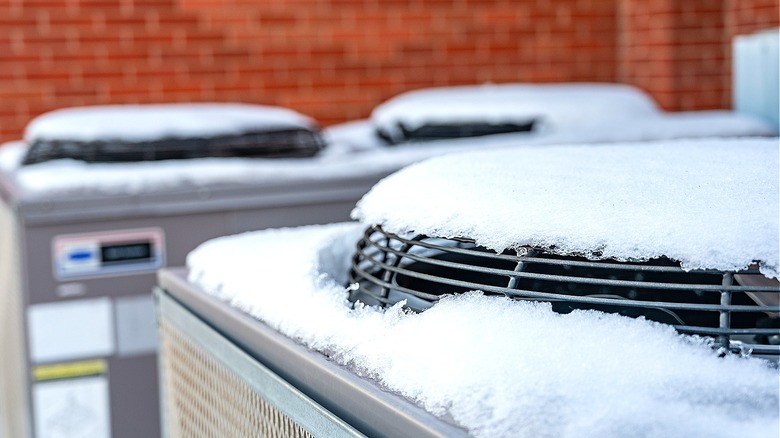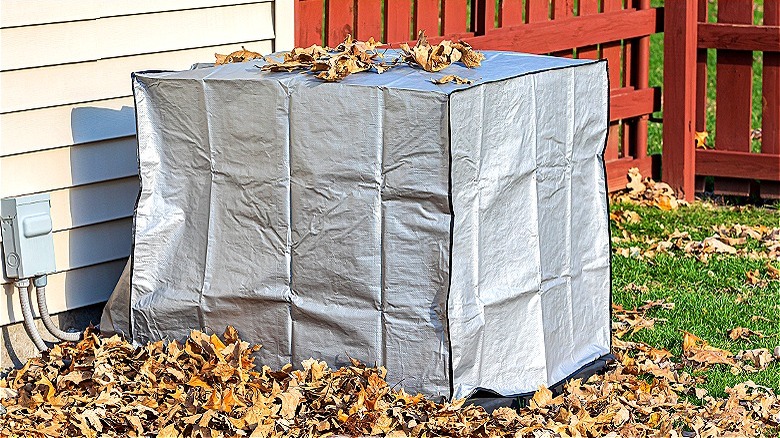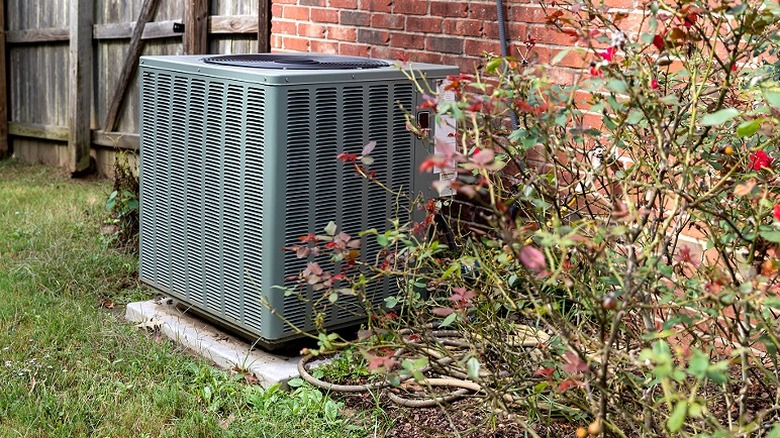The A/C Condenser Mistake That Will Attract Rodents To Your Home
The air conditioner (A/C) condenser is the large outdoor unit that helps to pull in air to cool homes during the warm months. And during the winter, this "box" sits idle. For those who live in snowy and icy conditions, it may seem logical to take a few steps during this time of year to protect the unit, such as covering it or wrapping it. But that would be a mistake. While such action is sure to minimize weather exposure, it also creates a nice, warmer place for rodents and other critters to call home throughout winter.
In short, you don't need to cover the A/C condenser over the winter months. It's not necessary nor advisable to wrap it in a tarp nor to place any type of large structure or material over the top of the unit. While rodents are a big concern here, there's a second risk as well. Moist air that gets into the A/C condenser when covered won't be able to evaporate as easily with a cover on and may end up pooling. That's going to create a higher risk for rust to develop within the unit, especially if this cooling down and warming up process happens numerous times.
There are a few steps to take in the fall months once you've shut down the A/C for the season. Doing that now could help protect your system throughout the winter without making the condenser a temporary wintertime home for rodents.
Modern systems don't need to be covered
Older air conditioners were much more prone to suffering damage from snow and ice during the winter months than newer models. Those extreme weather conditions, in the past, could lead to fraying of electrical lines and rust buildup of the interior working components, all of which could lead to a very expensive repair. Today's modern systems, however, are better protected and designed to be waterproof and durable. They can handle very high heat and very cold temperatures without suffering damage to them. Therefore, homeowners with such updated units no longer need to cover the condensers to shield the units from the elements. Doing so, in fact, would be a mistake that could lead, inadvertently, to some unwanted rodent guests.
But there's another consideration. For those who live where there's a significant amount of snowfall each winter, the weight of that snow could cause damage to the exterior fins of the condenser, pushing them down and even flattening them. That could make it harder for the system to move air during the summer. Since that's a potential concern, you may want to take a few steps to minimize this risk, such as placing a piece of plywood over the top of the condenser. Rest it on top of a smaller piece of wood or a two-by-four running in the opposite direction. This creates a gap between the wood board and the top of the condenser, helping to prevent snow and ice from accumulating directly on top of the unit. This should be sufficient; there's no need to wrap or cover an A/C condenser completely or try to make it waterproof. Remember, that's going to encourage pests to move in as they seek warmth.
How to protect your A/C condenser
While it would be a mistake to cover your modern A/C condenser during the winter months, another reason some may consider it a reasonable solution, though, is because of the possibility of falling leaves infiltrating the system, which could lead to a buildup of organic material within the unit. This, coupled with the snow and rain, creates a thriving place for mold to grow (and a messy cleanup later). To minimize this risk, cover the A/C compressor, but with a breathable material. This will allow for the air to move in and keep the space dry whenever possible, but it'll still block out any type of debris from entering. It's also not going to create a safe place for rodents.
Sometimes, it can be beneficial to place shrubs or other types of plant life around the exterior of the AC compressor. Some people do this to conceal the air conditioner, for example, while others do it to minimize wind and snow blowing into the sides of the unit and causing damage. While this could be helpful, it also creates the risk of more debris buildup within the system, making it less desirable overall. If you have a modern air conditioner, be sure to check with the manufacturer's instructions to determine what overwintering steps are necessary, if any.
You also want to be sure to minimize any type of rodent present that you do find since they can chew at the wiring. A pest professional could be the best option to call in this situation.


